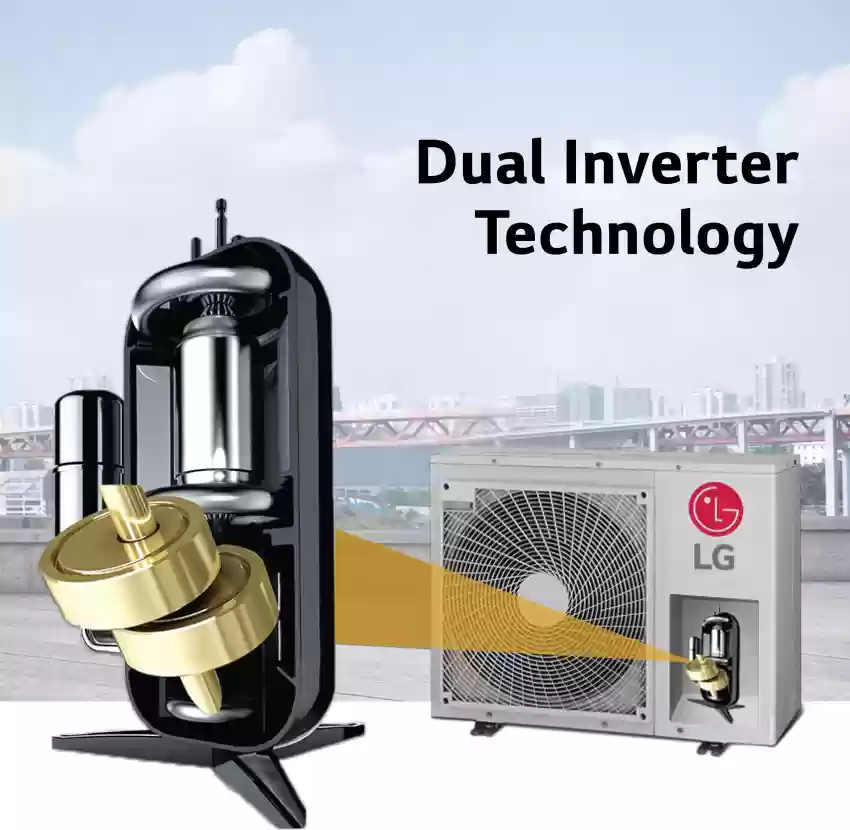Inverter ACs are meant for low energy consumption. However, the intensity of sound from the compressor may bother you. The sound is due to vibration caused by the rotary shaft of the compressor and the RPM at which it runs at peak load.
Dual Inverter AC solves both problems. It runs quiet and offers better efficiency than a single inverter AC. Let’s learn more about Dual Inverter AC here in this article.

What Is Dual Inverter AC?
Inverter AC is nothing new. Almost all the split ACs available in the market are inverter ACs. Dual AC is something new and only a few manufacturers have this feature in their ACs.
Dual Inverter AC uses two rotaries at a phase difference of 180 degrees concerning their compression timings. The BLDC motors used in these dual inverter ACs can offer the same level of compression at a much lower speed than a single inverter compressor. Due to this, you will get less sound and less vibration too.
Dual Inverter ACs also save more power than a single inverter AC as these ACs can run at a much lower frequency generally in the range of 700-8000 RPM. The lower frequency allows the AC to run at a much lower capacity based on the heat load. For example, A 2-ton AC can run as 1 ton or even as a 0.5-ton AC.
Benefits Of Dual Inverter AC
Dual inverter ACs come with several benefits as mentioned below. The benefits are more or less similar to Inverter ACs but less sound and less vibration is the added benefit.
Less Sound And Vibration
Due to the use of dual rotors, the frequency at which dual inverter AC runs is much lower than a single inverter AC. That is why there is less vibration and less vibration means less sound too.
Durability
Dual inverter AC has more number of parts than a single inverter AC. However a dual inverter AC always runs at a lower speed even at the peak load. That is why it puts less stress on their counterparts.
Less stress means less wear and tear and fewer chances of failure. A well-maintained dual inverter AC has at least 30-40% more lifespan than a single inverter AC
Less Power Consumption
There are a few factors that benefit to low power consumption of dual inverter ACs. First of all the low speed of the compressors helps in the low power consumption and on top of that the less stress on other counterparts elevates the benefits more.
Please note that although dual inverter ACs run at a much lower speed it offer the same amount of cooling at a much faster rate than a single inverter AC. A well-maintained and timely serviced dual inverter AC can offer up to 50% less power consumption than a single inverter AC.
Disadvantages Of Inverter AC
Dual Inverter ACs are good but there are a couple of drawbacks that you will have to deal with in case you plan to buy a dual-inverter AC
Initial Cost
The running cost is low but the initial cost is high compared to any single inverter AC. This is due to the use of dual rotary compressors and expensive sensors.
You need to figure out how quickly you can break even the additional cost that will likely spend on the dual inverter AC. If it is 3-5 years, it makes a good deal. Otherwise, for low usage, a single inverter AC will yield more savings
Expensive Repairs
If something goes wrong with your dual inverter AC, you need to be ready to face an expensive bill. Dual inverter technology is new and many technicians do not know how to deal with it. Those who know charge a premium. The regular servicing cost will also be higher.
Conclusion: Should You Buy A Dual Inverter AC?
Why not. But buy a dual inverter AC only if your usage is high. Otherwise, it might take more than 10 years to recover the extra money that you are spending on a dual inverter AC. 10 years is usually the maximum lifespan of an AC. So by the time you can recover your extra money, the AC will already reach its maximum life.
What Is Dual Inverter AC?
A dual inverter AC, as the name might suggest, makes use of a double rotary compressor, making it more efficient than a simple inverter and non-inverter air conditioner.
Does Dual Inverter AC Need Stabilizer?
The Inverter feature has nothing to do with the voltage stabilizer. Generally, Inverter ACs are designed to work within a wide voltage range which eradicates the need for a stabilizer. However, look at the spec and if you see the voltage range mentioned on the spec sheet is not within the range of voltage fluctuation that you normally see in your house, then hook up a stabilizer for enhanced safety.